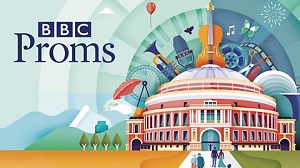
 United Kingdom BBC Proms Chamber Music 1: Debussy, Dutilleux, Mozart. Vertavo Quartet [Øyver Volle (violin), Annabelle Meare (violin), Berit Cardas (viola), Bjørg Lewis (cello)], Paul Lewis (piano) – Cadogan Hall, London. 18.7.2016. (LB)
United Kingdom BBC Proms Chamber Music 1: Debussy, Dutilleux, Mozart. Vertavo Quartet [Øyver Volle (violin), Annabelle Meare (violin), Berit Cardas (viola), Bjørg Lewis (cello)], Paul Lewis (piano) – Cadogan Hall, London. 18.7.2016. (LB)
Debussy– Cello Sonata (1915)
Dutilleux – Ainsi la nuit (1973-6)
Mozart – Piano Concerto No.12 in A Major, K414 (1782)
On one of the hottest days of the British summer thus far, the Vertavo Quartet and Paul Lewis performed the first of eight lunchtime BBC Proms chamber music concerts at Cadogan Hall this afternoon.
In an unusual, but enterprising programme of music by Debussy, Dutilleux and Mozart, the audience was treated to stimulating and satisfying performances of a sonata, a string quartet and a piano concerto.
The Vertavo Quartet, formed in 1984, are regular visitors to London, and enjoy a reputation for their principled and passionate performances. This afternoon saw the quartet’s debut performance at the Proms, however, as well as the Proms solo debut of the quartet’s cellist Bjørg Lewis, who gave an exquisite performance of Debussy’s cello sonata, with her husband Paul Lewis at the keyboard.
Lewis’s powerful but suitably controlled contribution provided the perfect underpinning to the passionately beseeching voice of Bjørg’s 1748 Gagliano cello, the instrument previously played by Martín Lovett, cellist of the Amadeus Quartet. From the declamatory opening of the piano and through every mischievous twist and turn, the husband and wife duo demonstrated absolute unity of musical purpose, coupled with a level of technical assurance that further enhanced the musical satisfaction quotient.
We were then treated to a rare and welcome performance of Dutilleux’s only string quartet, Ainsi la nuit (Thus the Night).
Ainsi la nuit was commissioned by the Koussevitzky Foundation for the Julliard Quartet, and is dedicated “to the memory of Ernest Sussman and in homage to Olga Koussevitzky”. Based on a single hexachord, its seven related movements, that focus on different aspects of sound production, amongst which pizzicato, harmonics and dynamic contrast, are played without a break.
The Vertavo Quartet seemingly relished the challenge and presented an assertive performance, with each successive movement characterised by pronounced musical coherence and thought-provoking imagination.
Mozart’s twelfth piano concerto, in the arrangement for solo piano with string quartet, was the final piece on the programme. In addition to the spectacle of seeing and hearing a work usually associated with larger orchestral forces, these excellent arrangements present the opportunity to explore and experience the more intimate aspects of the music, and in a more direct and immediate manner. There is no need for the compromises invariably associated with the soloist versus orchestra model; the nature of the interaction between soloist and ensemble is transformed into something much more egalitarian, the concerto title notwithstanding.
The Vertavo Quartet’s affectionate enunciation of the first movement subject material, augured well; it was tender in the piano dynamics, eloquent in the fortes, rhythmically vital throughout, and always alert to the possibilities for creative interplay and for effectively exploiting every subtle nuance. Such effervescence lured Paul Lewis into making delicate and well judged contributions to the orchestral ritornello, and by the time the soloist’s entry was finally and unequivocally announced, he literally seized the opportunity with both hands.
His immaculate performance exemplified many of the qualities and depth of understanding one would ideally associate with aspirations for perfection and supreme integrity in the realisation of classical idiom. In the notoriously challenging acoustic of Cadogan Hall I did at times yearn for greater weight and breadth in the bass line, and there are of course arrangements of these Mozart concertos that include the use of a double bass.
I for one would happily have stayed a little longer to hear the ensemble perform a few more Mozart concertos.
Leon Bosch
